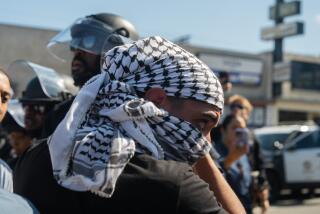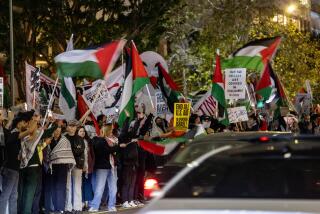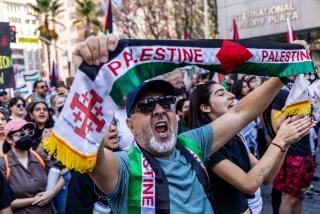Los Angeles police ready for May Day immigrant rights rally
This year’s May Day rally is expected to draw fewer immigrant rights activists to downtown Los Angeles than in past years, but police said they would be prepared for any problems that might occur.
Marchers will assemble at 10 a.m. Sunday at the intersection of Broadway and Olympic Boulevard and walk north on Broadway toward City Hall, officials said. The march will conclude with a rally on Broadway between First and Temple streets near City Hall.
Organizers said the demonstration could draw more than 50,000 people, but permits sought for the march estimate a crowd of about 10,000.
Whatever the turnout, police said, they would be ready with a significant deployment of officers.
“We are going to have a large enough deployment to handle anything,” said LAPD Deputy Chief Jose Perez. “Our posture will be consistent with what we’ve had the last two years. We want to keep a lid on anything, but, ideally, we are going to maintain a low profile and facilitate allowing everybody to express their 1st Amendment views in a peaceful and organized manner.”
As in the past, the annual immigrant and labor rights march is seen as a way to rally public support for federal legislation that would legalize the nation’s 11 million illegal immigrants.
But planning for Sunday’s rally has been marked by division among some immigrant rights groups over how best to push for change.
At odds are the Full Rights for Immigrants Coalition, which has support from the Los Angeles County Federation of Labor, and the smaller grass-roots group, the Southern California Immigration Coalition, which had sought to organize its own march.
In a statement on its website, the Southern California group alleges that its larger rival is unofficially funded and directed by the Democratic Party, which some chastise for stalling reforms while increasing the deportation of illegal immigrants.
Decrying the Full Rights group as “opportunist, disrespectful, sexist, dishonest and politically backwards,” the statement reads: “If you want to listen to [radio host] El Piolin, Mayor Villaraigosa or anti-revolutionary [gusanos, Spanish for ‘worms’] like Emilio & Gloria Estefan at a ‘May Day’ rally, please join their march.”
In a telephone interview, Southern California organizer Gloria Saucedo was more restrained.
“We’ve all struggled for many years. I think this is frustration for having worked so hard and not having achieved an immigration reform,” said Saucedo, a legal immigrant from the Mexican state of Jalisco. “These are personal things. They’re not about the cause. What unifies us is the desire to have immigration reform. We’re going to march for the same principles.”
Meanwhile, Full Rights coordinator Juan Jose Gutierrez, a U.S. citizen who is an immigrant from Jalisco, said, “I’m a Democratic Party member and proud of it. I wish groups like ours would get the kind of funding that they are claiming we get. We’d be able to do a lot more.”
The tenor of the dispute is a far cry from the excitement and unity that infused the May Day march in 2006, when, at the urging of grass-roots organizations and Spanish-language radio hosts, hundreds of thousands of people turned out to march through downtown.
Since then, activists have deemphasized street actions in favor of change at the ballot box through promoting citizenship and voter registration. But last May, galvanized by Arizona’s controversial anti-immigration law, about 60,000 demonstrators took to the streets in Los Angeles.
Marching and voting “go hand in hand,” Gutierrez said. “Demonstrations serve the purpose of reminding the nation that the problem has not been resolved.”
More to Read
Sign up for Essential California
The most important California stories and recommendations in your inbox every morning.
You may occasionally receive promotional content from the Los Angeles Times.










